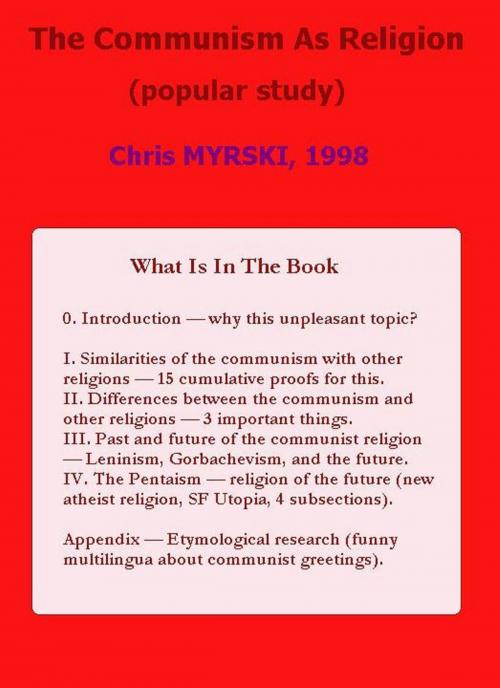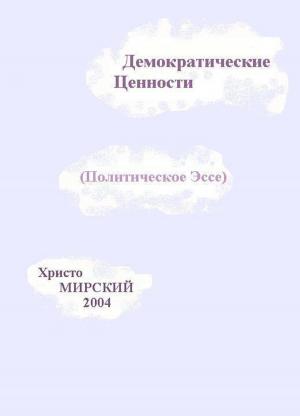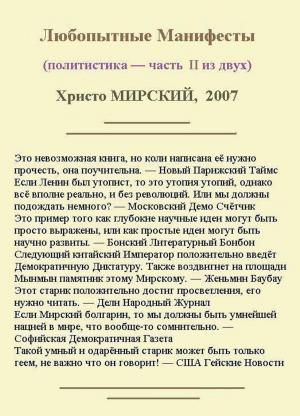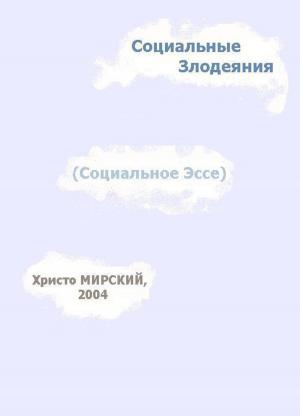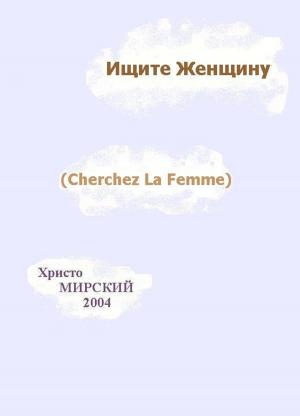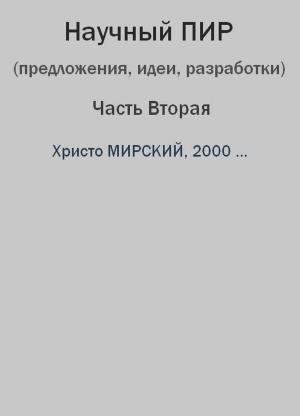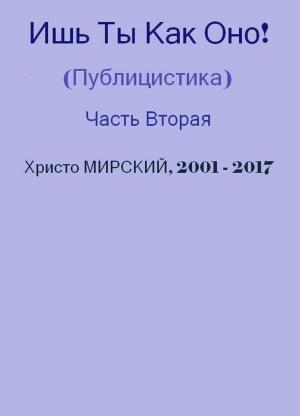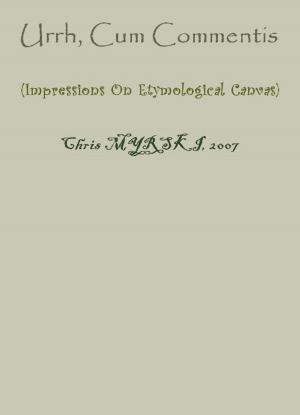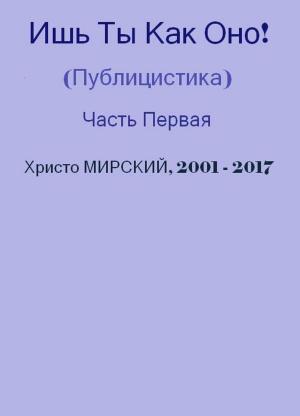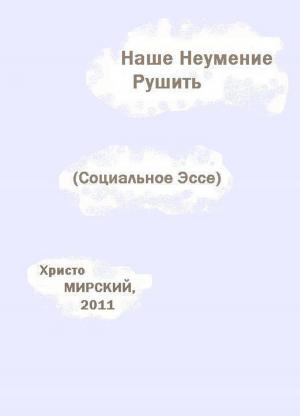The Communism As Religion (popular study)
Nonfiction, Social & Cultural Studies, Political Science, Government, Communism & Socialism| Author: | Chris Myrski | ISBN: | 9781370067374 |
| Publisher: | Chris Myrski | Publication: | May 25, 2017 |
| Imprint: | Smashwords Edition | Language: | English |
| Author: | Chris Myrski |
| ISBN: | 9781370067374 |
| Publisher: | Chris Myrski |
| Publication: | May 25, 2017 |
| Imprint: | Smashwords Edition |
| Language: | English |
*Introduction*
Despite the various discussions about the benefits or disadvantages of the communism, discussions which usually don't lead to undivided conclusions, because each thing depends on the time and place, each medicine — on the dose, each government — on the object of governing, each democracy — on the demos, et cetera, it seems that this consideration is necessary for Bulgarian (and not only) people, or at least for its thoughtful part. It is necessary not so much to find new culprits for the crisis or catastrophe in Bulgaria, but to throw suitable light on the question, because the crisis, as it turns out, has begun /after/ our rejection of communism, and direct proofs for the advantages or disadvantages of it we, still, /don't/ have, because we have not the so called "control group", as the medics say, which has always to be present in examination of some medicament, in order to make justified comparison, i.e. we haven't two Bulgarian countries: one communist and another not, to compare the results. The Germans had two Germanies and nevertheless their situation isn't unquestionable, because they have not possessed equal natural resources, nor were equally big, nor equally destroyed in the war, and in addition the eastern part supported to a certain extent the Socialist Block, by the simple reason that in a common lead of horses more than all other suffer the stronger horses (and win the weaker ones — such like Bulgaria, for example). We have not such proof and can compare ourselves, either with our brethren in destiny: from the former communist countries like Czechs, Slovaks, Hungarians, etc. — what parallel isn't to our advantage —, either with our territorial neighbours of non-communist type of state like Greece or Turkey — what comparison nowadays also isn't to our benefit. Of course we can compare us with the "severe" cases like Serbia, Chechnya, and other regions, where people slaughtered themselves, and we still didn't (though there are reasons for this — more or less slavish psyche of the Bulgarians inherited as a result of our five centuries Turkish yoke), but in such case why don't compare us with, say, Rwanda, for to feel more elevated?
Our goal, however, isn't to discuss now these questions, but to clear as much as possible the phenomenon of communism, which *carries all significant characteristics of a religion*, though the difficulty in comprehending this arises because of our nearness in time, and to a social event one has to look, it seems, always from a certain distance, as is the case with pictures and other works of art, where one has to retreat a bit away in order to appraise the things better. The other hindrance in thinking through the mentioned fact comes from our /delimited understanding/ about the religion, in sense of whether it is mono- or poly- theistic, whether there exists reincarnation of the soul or not, whether it requires sacrifices or not (of humans or only of animals), whether the dead have to be buried (with clothes or not), or thrown in the sea, or burned on pyres, or embalmed and left in some buildings (be they tombs, pyramids, or something else), whether men have to perform circumcision or not, whether sexual contacts are allowed only between the married pair, or between more individuals (more men, or more women, or more of the both kinds) et cetera, et cetera. But all this is just a /qualification/ of existing religions, which, as a rule, includes only this what is yet known, and frequently excludes that what is still new and not ordered!
And so one for a bit more. Then follow the next chapters, namely
I. Similarities of the communism with other religions (15 points)
II. Differences between the communism and other religions (3 things)
III. Past and future of the communist religion (also 3 points)
IV. The /pentaism/ — religion of the future (4 subsections)
Appendix —- Etymological research (multilingua)
The whole volume is about 140,000 chars with spaces, or 80 pages.
*Introduction*
Despite the various discussions about the benefits or disadvantages of the communism, discussions which usually don't lead to undivided conclusions, because each thing depends on the time and place, each medicine — on the dose, each government — on the object of governing, each democracy — on the demos, et cetera, it seems that this consideration is necessary for Bulgarian (and not only) people, or at least for its thoughtful part. It is necessary not so much to find new culprits for the crisis or catastrophe in Bulgaria, but to throw suitable light on the question, because the crisis, as it turns out, has begun /after/ our rejection of communism, and direct proofs for the advantages or disadvantages of it we, still, /don't/ have, because we have not the so called "control group", as the medics say, which has always to be present in examination of some medicament, in order to make justified comparison, i.e. we haven't two Bulgarian countries: one communist and another not, to compare the results. The Germans had two Germanies and nevertheless their situation isn't unquestionable, because they have not possessed equal natural resources, nor were equally big, nor equally destroyed in the war, and in addition the eastern part supported to a certain extent the Socialist Block, by the simple reason that in a common lead of horses more than all other suffer the stronger horses (and win the weaker ones — such like Bulgaria, for example). We have not such proof and can compare ourselves, either with our brethren in destiny: from the former communist countries like Czechs, Slovaks, Hungarians, etc. — what parallel isn't to our advantage —, either with our territorial neighbours of non-communist type of state like Greece or Turkey — what comparison nowadays also isn't to our benefit. Of course we can compare us with the "severe" cases like Serbia, Chechnya, and other regions, where people slaughtered themselves, and we still didn't (though there are reasons for this — more or less slavish psyche of the Bulgarians inherited as a result of our five centuries Turkish yoke), but in such case why don't compare us with, say, Rwanda, for to feel more elevated?
Our goal, however, isn't to discuss now these questions, but to clear as much as possible the phenomenon of communism, which *carries all significant characteristics of a religion*, though the difficulty in comprehending this arises because of our nearness in time, and to a social event one has to look, it seems, always from a certain distance, as is the case with pictures and other works of art, where one has to retreat a bit away in order to appraise the things better. The other hindrance in thinking through the mentioned fact comes from our /delimited understanding/ about the religion, in sense of whether it is mono- or poly- theistic, whether there exists reincarnation of the soul or not, whether it requires sacrifices or not (of humans or only of animals), whether the dead have to be buried (with clothes or not), or thrown in the sea, or burned on pyres, or embalmed and left in some buildings (be they tombs, pyramids, or something else), whether men have to perform circumcision or not, whether sexual contacts are allowed only between the married pair, or between more individuals (more men, or more women, or more of the both kinds) et cetera, et cetera. But all this is just a /qualification/ of existing religions, which, as a rule, includes only this what is yet known, and frequently excludes that what is still new and not ordered!
And so one for a bit more. Then follow the next chapters, namely
I. Similarities of the communism with other religions (15 points)
II. Differences between the communism and other religions (3 things)
III. Past and future of the communist religion (also 3 points)
IV. The /pentaism/ — religion of the future (4 subsections)
Appendix —- Etymological research (multilingua)
The whole volume is about 140,000 chars with spaces, or 80 pages.
